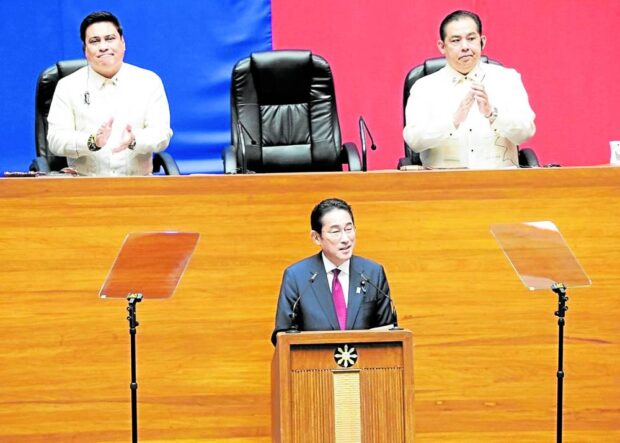
Japanese Prime Minister Kishida Fumio announces before the Philippine Congress that he and President Ferdinand Marcos Jr. have agreed to start formal talks on a reciprocal access agreement. (Photo from the House of Representatives)
MANILA, Philippines — Other countries have been turning the Philippines into their military training ground, which puts its people at risk and weakens its sovereignty.
ACT Teacher party-list Rep. France Castro and the Bagong Alyansang Makabanay (Bayan) raised that point in separate statements on Saturday as they opposed the proposed reciprocal access agreement (RAA) between the Philippines and Japan.
Castro and Bayan issued their statements after Japan Prime Minister Kishida Fumio announced before the Philippine Congress that he and President Ferdinand Marcos Jr. had agreed to start formal talks on the RAA, aimed at further deepening strategic cooperation between the two countries.
‘We are just being used’
“This is just one of the reasons why we oppose the proposed Philippines-Japan security agreement. Our country is becoming a military training ground for industrialized nations while at the same time endangering our population and they are just giving us scraps of their military hardware,” Castro said.
READ: Japan PM Kishida pushes for ‘free, open Indo-Pacific’ in visit to PH
“As Bagong Alyansang Makabayan (Bayan) President Renato Reyes said, ‘We oppose the planned Philippines-Japan military access agreement which is another version of a ‘visiting forces agreement’ that would allow Japanese troops to join military exercises in the Philippines, including those with the US,” Castro added.
“The proposed security agreement is seen as part of the entire US military network in the region, with Japan serving as a junior partner of the US and the Philippines playing a role as a vital cog of the US war machine in the region.”
Castro fears that the Philippines might be dragged into the struggle for position between global powers — the US, China, and Japan — with the existing Visiting Forces Agreement (VFA) with the US and the proposed RAA.
“We are caught in the struggle between superpowers, and yet they are only pushing for their own interests and we are just being used. We should stop this dependence and strive for a truly independent foreign policy, credible defense, and economy,” Castro said partly in Filipino.
Weakening PH sovereignty
In its statement, Bayan said an RAA with Japan would only weaken Philippine sovereignty — instead of strengthening it, supposedly by promoting territorial integrity — because the country would still rely on foreign powers to fend off China’s intrusions into the West Philippine Sea (WPS).
The RAA, Bayan said, would only make the situation more volatile, as having US and Japanese forces on Philippine soil may cause China to justify its incursions.
“The Reciprocal Access Agreement and Official Security Assistance offered by Japanese Prime Minister Fumio Kishida to the Philippines will add to an already volatile mix of military forces that might engulf the region into war instead of averting it,” Bayan said.
“While appearing to counter China’s aggressive actions in the West Philippine Sea, placing Japanese military troops, facilities, and equipment in the Philippines on a semi-permanent or permanent basis might actually do the opposite — justify even more military actions from China. This never-ending escalation puts the Philippines right smack in the middle of an arms race between China on one side, and the US, Japan, and Australia on the other,” it added.
Demilitarize the region
Instead of inviting another superpower into the mix, Bayan maintains that the best course of action is to “demilitarize the region and deescalate tensions” even if the Philippines continues to assert its sovereignty at the WPS.
“There are many other military and diplomatic areas of cooperation that do not necessitate tying us down to another military access agreement. No real peace and development can be achieved if the Philippines ends up as a mere forward base for the US and Japan,” Bayan explained.
“Adding foreign troops and bases on our shores ultimately undermines our sovereignty aside from potentially escalating tensions in the Pacific. It endangers the security and welfare of our people since foreign bases can be targeted by various forces aside from being used as a launching pad to attack other nations,” it added.
Zubiri allays fear of abuse
Earlier, Senate President Juan Miguel Zubiri allayed fears that the RAA would make Filipino women more vulnerable to sexual abuse. He noted that there would be guidelines that Japanese soldiers must follow should the RAA be ratified.
Zubiri also mentioned that the VFA with the US resulted in two incidents only after 30 years of skill exchanges between the two countries. This, he said, indicated that chances of abus happening under the RAA would be slim because Japanese soldiers were disciplined.
Zubiri was referring to the two incidents involving US soldiers who were dragged into controversies regarding sexual abuse — Marine Lance Corporal Daniel Smith who was tried for the 2005 rape of a Filipino woman and Private First Class Joseph Scott Pemberton who admitted to killing transgender Jennifer Laude.
Zubiri made the assurance as Castro and Gabriela party-list Rep. Arlene Brosas expressed concerns over the RAA. Castro and Brosas pointed out that Japan had not even apologized to Filipino women who were sexually abused by Japanese soldiers during the Second World War.